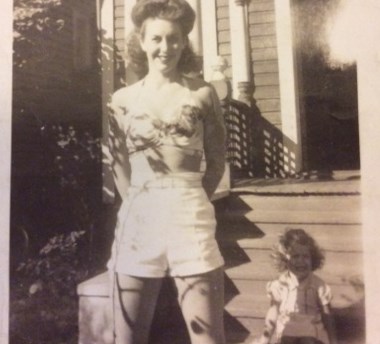I was one of the first women to join the Canadian Women’s Army Corp (CWAC) at Work Point Barracks in Victoria in l941.
The CWAC was not yet properly organized. We didn’t have uniforms, simply a red arm band with CWAC superimposed in yellow. Behind a weak Navy band, we actually went on route marches in high heels dodging puddles.
I met and fell in love with a sailor.
My sailor and I were married on June 21, 1941. We lived in a dream world. I was a very young 18 and he was a very young 20-year-old member of the Royal Canadian Navy.
We slept a lot of nights in the broom bushes in Beacon Hill Park in Victoria when we didn’t have money for a room. I climbed an oak tree and waited for him to come from barracks every night. We knew he was going to be shipped overseas, but tried not to think about it during the three months we had together before he left.
I worked for the Royal Canadian Engineers at Work Point Barracks as a typist. One night he came “home” to our tree and told me it was rumoured that he would be leaving within a couple of days.
As I said, I was 18, madly in love, and my sailor was leaving. So, what to do?
At that time the CWAC hadn‘t had time to enlist a doctor for women, so I devised a plan. I would tell them I was pregnant, get a medical discharge, go east to be with my husband until he left for overseas and then say I had suffered a miscarriage and rejoin the CWAC.
My grandfather was a captain in the British Army during the Boer War in South Africa, and my father was in the Canadian Mounted Rifles in the First World War for four years. My only sibling, a sister, joined the CWAC when she was old enough, so I was a proud member of a military family and had every intention of rejoining the army.
Within a week of the rumour, my love and I travelled by boat (the old Princess Marguerite) from Victoria to the train station at the foot of Granville St., in Vancouver, where we kissed goodbye. I went back to Victoria to set my plan in motion. It worked.
Now, all I had to do was round up the money for train fare to Halifax. Sitting up for five days and nights on the train in an old wooden Colonial coach was not a lot of fun.
The fare was $60.60 from Vancouver to Halifax, which I scraped up from everyone I knew. My mum bought me a bowl of fruit to eat on the train and a girlfriend loaned me a winter coat.
The last I heard from my husband was a terse telegram, “Don’t come, I might not be here.”
I answered back, “Be there, I’m coming.” And I did. He went into the high temperature stokehold aboard a ship and then went outside and rolled in the snow trying to catch pneumonia, so he’d be there when I arrived. He didn’t even catch a cold and was at the train station to meet me.
We spent 11 wonderful days together in a ghastly room with a broken window. The room was above a café where a juke box played Mares eat oats and does eats oats and little lambs eat Ivy all night.
I still hate that song. Day after day, I sat at the window at dusk watching the freighters and navy ships stealing quietly out of Halifax harbour to form convoys to brave the North Atlantic, wondering if my sailor was on one of them, but every night he came home, until one night, he didn’t.
It was Dec. 12. Another sailor knocked on our door, saying my husband said he loved me and goodbye. So, there I was in Halifax, alone and broke.
A military family was allowed one free move across Canada to relocate. So, I went to the Navy Control Board and told them I was from Victoria and would they please send me home? They did. This time, with a berth.
But the joke was on me. And after all that planning, in fact I was pregnant! My sailor didn’t come back until our baby girl was almost three years old. He came home on “survivor’s leave” when his ship, the HMCS Athabaskan, was sunk off the French coast.
That was both a joyous and horrific homecoming for him, because all the mums and dads, wives and sisters of the crew of the sunken Athabascan wanted to know if he had “seen their loved one” in the water, on a raft, picked up by a German craft, anywhere at all.
We were so young when he left we didn’t know if we would recognize each other when he arrived at the platform where we had kissed goodbye so long ago. And his small daughter thought his picture was “daddy” whom she kissed good night every night and didn’t relate to him in the flesh at all. Like so many other wartime marriages, ours failed. Our baby girl is now a grandmother. My sailor was killed in a one-person road accident in northern B.C. on May 24, l970. And I’m an old lady with lots of memories.
Nadine Jones is a former journalist with the Vancouver Sun and currently a resident at The Maple Residences in Steveston



